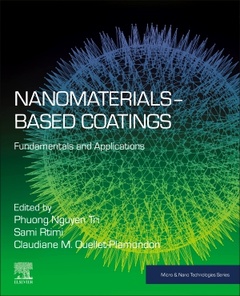Description
Nanomaterials-Based Coatings
Fundamentals and Applications
Micro and Nano Technologies Series
Coordinators: Nguyen Tri Phuong, Rtimi Sami, M. Ouellet-Plamondon Claudiane
Language: English
Subject for Nanomaterials-Based Coatings:
480 p. · 19x23.3 cm · Paperback
Description
/li>Contents
/li>Readership
/li>Biography
/li>Comment
/li>
Nanomaterials-Based Coatings: Fundamentals and Applications presents the fundamental concepts and applications of nanomaterial-based coatings in anticorrosion, antiwear, antibacterial, antifungal, self-cleaning, superhydrophobic, super hard, super heat resistance, solar reflective, photocatalytic and radar absorbing coatings. It is an important resource for those seeking to understand the underlying phenomenal and fundamental mechanisms through which nanoparticles interact with polymeric and metallic matrices to create stronger coatings. As nanomaterials-enforced coatings are smarter, stronger and more durable, the information listed in this book will helps readers understand their usage and further applications.
1. Nanomaterials based coatings: an introduction 2. Polymer based nanocomposite coatings 3. Antibacterial and antifungal 4. Conducting nanocomposite coatings 5. Pulse potential deposition of vinylic polymers based on the diazonium chemistry: recent development and application 6. Application of nanomaterials in textile coatings and finishes 7. Structural, mechanical and tribological characteristics of diamond-like carbon coatings 8. Anti-corrosion and anti-wear 9. Hard and superhard nanostructured and nanocomposite coatings 10. Radically curable nanobased coatings 11. Unveiling nano conducting polymers and composites for corrosion protection 12. Nanostructured superhydrophobic coatings for solar panel applications 13. Smart anticorrosive coatings containing corrosion inhibitor-loaded halloysite nanotubes
Dr. Sami Rtimi, PhD is Scientific Advisor at the Swiss Federal Institute of Technology (EPFL). He is an expert in thin film design and preparation for self-sterilizing and self-cleaning applications. Dr. Rtimi has authored several peer-reviewed studies and reviews, book chapters, patents, and presented at several international meetings & conferences. He i
- Highlights the latest methods in design, preparation and characterization techniques for nanomaterials-based coatings
- Discusses emerging applications of nanomaterials-based coatings, including substrates protection, sustainable energy, and in the environment and healthcare
- Assesses the major challenges in making nanomaterials-based coatings more reliable and cost-effective




